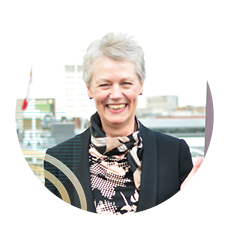FIONA CRISP HAD A EARLY INVOLVEMENT WITH CORPORATE TREASURY. HERE SHE DISCUSSES HER CAREER PATH.
Tell us about your career background.
 I started in treasury very early on in my career. I did an MBA after my degree and fell into treasury when I was invited to join the treasury team at BICC, the cable company, working for John Grout, The Association of Corporate Treasurers' (ACT's) former director of policy and technical. I had a great grounding with BICC and got a chance to do just about everything in corporate treasury and took three of the ACT exams at that time. I left BICC after about four years to find out what happens in other companies, joining Deloitte as a consultant.
I started in treasury very early on in my career. I did an MBA after my degree and fell into treasury when I was invited to join the treasury team at BICC, the cable company, working for John Grout, The Association of Corporate Treasurers' (ACT's) former director of policy and technical. I had a great grounding with BICC and got a chance to do just about everything in corporate treasury and took three of the ACT exams at that time. I left BICC after about four years to find out what happens in other companies, joining Deloitte as a consultant.
I loved that experience and went to join a client, Barings Securities, as treasurer. From there I went to SG Warburg and set up a central treasury function, but the hours just expanded ridiculously, and I had three young children, so I left there fairly quickly, setting up as an independent consultant. I have done an enormous amount of different things, mostly treasury-related, over the past 25 years that I've been independent.
What's been notable about those treasury experiences?
Diversity of experience - BICC was doing a large number of projects internationally, so we had M&A, corporate finance, FX and big debt issuances. We used derivatives and were the first corporate to use the London International Financial Futures and Options Exchange (LIFFE), which was really exciting. We had to move a hedge we had in Chicago across into London, which we did as soon as LIFFE opened.
Going into other corporates, it was interesting to see the different priorities in different companies.
What has been key throughout is how important it is for treasury to be part of the business and not just part of finance.
What are some of the most significant changes you've seen in treasury?
The first thing I would say is technology. If you look at market information, for instance, we used to have a Reuters machine when I worked at BICC. You had to know the page numbers and it was a nightmare to work. You look at the enormous diversity of management information and market information today and it's quite staggering. Treasury management systems (TMSs) also - at BICC, we had dial-up hosted transaction recording systems, effectively. I managed to break ours. We had more than 100 transactions coming to the year end. We'd hedged everything for the year and the system was only built for 99. Now we have could-based TMSs; we have fully interconnected systems and the controls are so much better.
What are the opportunities like in treasury for women and, more generally, for the younger generation of treasurers coming through?
I think the fact that a lot of the training has gone online has made it accessible not just for women, but for a range of people - people who want to work part-time, people who are international and people who can't take time out as standard one evening a week for studying. And that is a really big benefit.
Who has been important in your career?
I know I was very lucky in having John Grout as my mentor. I really felt like he was backing me at every opportunity. More generally, in terms of building relationships, I think the Association of Corporate Treasurers Mentor Me programme has been valuable to a wide group of people.
What has been the greatest source of satisfaction in your treasury career?
The opportunity to go and do all sorts of things that you might not otherwise get to do. I spent a year at the pensions regulator, for example, running a risk management team. If I hadn't been in treasury, there is no way I would have got to do that.
